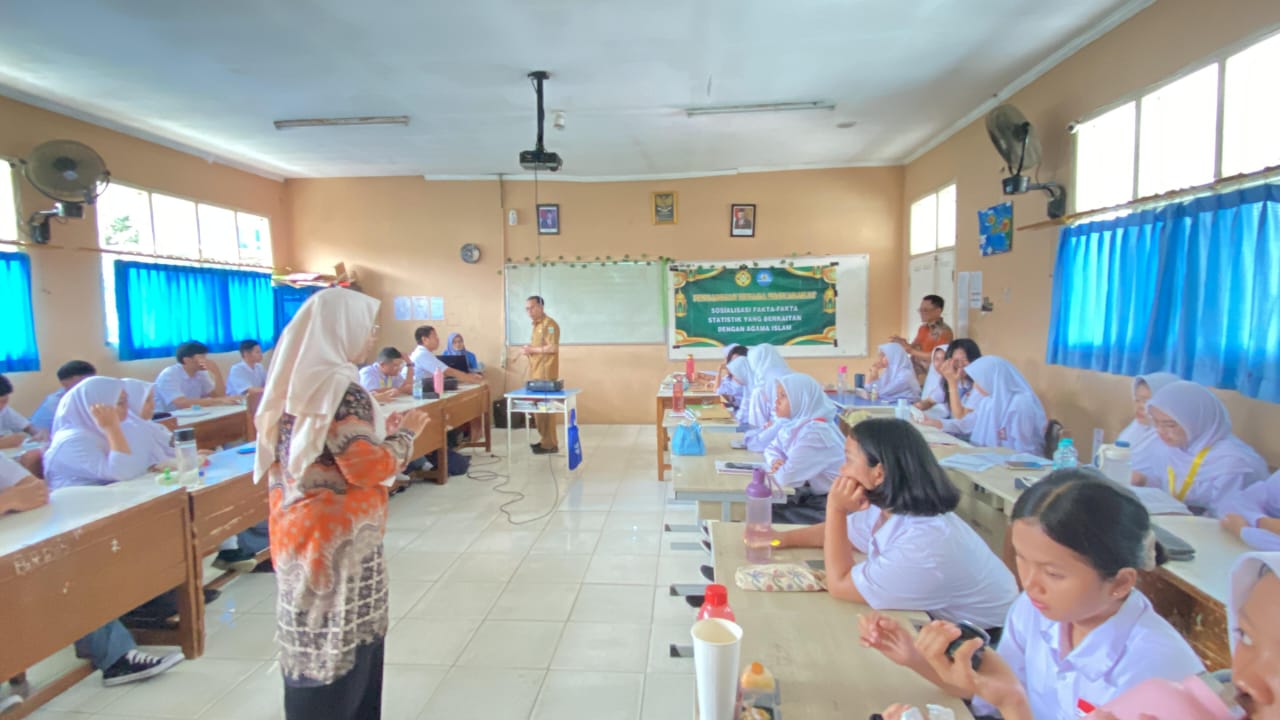Peningkatan kemampuan berpikir prosedural dan numerik dalam statistika melalui integrasi nilai-nilai keislaman
DOI:
https://doi.org/10.53088/penamas.v5i2.1735Keywords:
Community Service, Statistics, Islamic Education, Procedural Thinking, SocializationAbstract
The objective of this Community Service activity is to improve the understanding of students of SMAN 6 South Tangerang City of the basic concepts of statistics through an integrative approach with Islamic religious values. This approach is focused on strengthening students’ procedural and numerical thinking skills in solving statistical problems. The methods used in this activity include interactive lectures, group discussions, and problem exercises contextualized with Islamic spiritual values. The activity results showed that most students could understand the steps of solving statistical problems procedurally and experienced an increase in connecting statistical symbols and concepts with their experiences and religious values. The participants’ enthusiasm during the activity also reflected the effectiveness of this value-based approach in strengthening students’ thinking and numeracy skills.
References
Al-Attas, S. M. N. (1990). The Concept of Education in Islam. ISTAC.
Bella, L. I., & Anggraeni, W. (2024). Peran Pendidikan Agama Islam terhadap Pembelajaran Matematika. Religion: Jurnal Agama, Sosial, Dan Budaya, 3(2), 640–650.
Branch, R. M. (2009). Instructional Design: The ADDIE Approach. Springer. https://doi.org/10.1007/978-0-387-09506-6
Brutu, D., Annur, S., & Ibrahim, I. (2023). Integrasi Nilai Filsafat Pendidikan Dalam Kurikulum Merdeka Pada Lembaga Pendidikan Islam. Jambura Journal of Educational Management, 442–453. https://doi.org/10.37411/jjem.v4i2.3075
Daryanto. (2016). Inovasi Pembelajaran Efektif. Gava Media.
Djawa, Y., Aksan, S. M., & Azmar, A. (2023). Pengaruh Impelemetasi Nilai-Nilai Islam Melalui Pendekatan Saintifik Terhadap Hasil Belajar Matematika Siswa Mts Negeri Di Pulau Morotai. Jurnal Magister Pendidikan Matematika (JUMADIKA), 5(1), 31–37. https://doi.org/10.30598/jumadikavol5iss1year2023page31-37
Fitriyani, D., & Kania, N. (2019). Integrasi nilai-nilai keislaman dalam pembelajaran matematika. Prosiding Seminar Nasional Pendidikan, 1, 346–352.
Garfield, J., & Ben-Zvi, D. (2008). Developing Students’ Statistical Reasoning: Connecting Research and Teaching Practice. Springer.
Hiebert, J., & Lefevre, P. (1986). Conceptual and Procedural Knowledge in Mathematics: An Introductory Analysis. In J. Hiebert (Ed.), Conceptual and Procedural Knowledge: The Case of Mathematics (pp. 1–27). Lawrence Erlbaum.
Indriyani, Nugraha, A., & Putri, A. R. (2024). Pengembangan E-LKPD Project Based Learning Bertema 7th SDGs Affodable and Sustainable Energy Untuk SD. Pendas: Jurnal Ilmiah Pendidikan Dasar, 9(3), 2081–2094. https://doi.org/10.23969/jp.v9i3.17620
Lestari, N. D., Hermawan, R., & Heryanto, D. (2018). Pengembangan media pembelajaran menggunakan powtoon untuk pembelajaran tematik sekolah dasar. Jurnal Pendidikan Guru Sekolah Dasar, 3(3), 33–43. https://doi.org/10.17509/jpgsd.v3i3.20748
Nur, A. S., & Palobo, M. (2017). Pengaruh penerapan pendekatan kontekstual berbasis budaya lokal terhadap kemampuan pemecahan masalah matematika. Aksioma, 6(1), 1–14. https://doi.org/10.22487/aksioma.v6i1.136
Rahayu, D. V. (2012). Meningkatkan Kemampuan Pemecahan Masalah Matematis Siswa melalui Pendekatan Pembelajaran Kontekstual. Mosharafa: Jurnal Pendidikan Matematika, 1(2), 73–82. https://doi.org/10.31980/mosharafa.v1i2.241
Ramadhany, A., & Prihatnani, E. (2020). Pengembangan Modul Aritmerika Sosial Berbasis Problem Based Learning untuk Siswa SMP. Jurnal Cendekia, 4(1), 212–226. https://doi.org/10.31004/cendekia.v4i1.155
Susanti, R. (2019). Pembelajaran Kontekstual dalam Meningkatkan Kemampuan Pemecahan Masalah Statistika. Jurnal Ilmiah Pendidikan Matematika, 8(2), 134–142. https://doi.org/10.25273/jipm.v8i2.4114
Watson, J. M. (2006). Statistical Literacy at School: Growth and Goals. Routledge. https://doi.org/10.4324/9780203968026
Zohar, A., & Dori, Y. J. (2003). Higher Order Thinking Skills and Low-Achieving Students: Are They Mutually Exclusive? The Journal of the Learning Sciences, 12(2), 145–181. https://doi.org/10.1207/S15327809JLS1202_1

Downloads
Published
How to Cite
Issue
Section
License
Copyright (c) 2025 Dewi Purnama Sari, Ahmad Nana Mahmur Mulyana, Rachmatullah Rusli, Dwi Feriani, Yandra Ega Septian, Karmila Karmila

This work is licensed under a Creative Commons Attribution-ShareAlike 4.0 International License.
Authors who publish with this journal agree to the following terms:
The author(s) retain copyright and grant the journal the right of first publication with the work simultaneously licensed under a CC BY-SA 4.0 license that allows others to remix, adapt, and build upon the work even for commercial purposes, as long as they credit the author(s) and license their new creations under the identical terms.
License details: https://creativecommons.org/licenses/by-sa/4.0/


